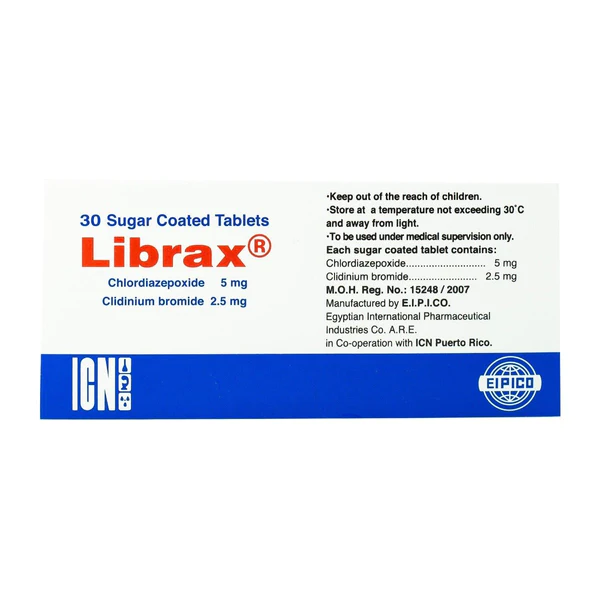In the realm of managing certain gastrointestinal and anxiety-related issues, Librax Tablet have emerged as a notable medication. Understanding its uses, potential side effects, interactions, and frequently asked questions (FAQs) is essential for comprehensive knowledge and informed usage.
What are Librax Tablets?
Librax Tablets represent a pharmaceutical formulation comprising two active ingredients: chlordiazepoxide and clidinium. This combination medication is renowned for its effectiveness in addressing specific gastrointestinal and anxiety-related conditions, offering a dual-action approach to manage diverse health concerns.
Chlordiazepoxide, a benzodiazepine, possesses anxiolytic (anxiety-reducing) properties. It acts on the central nervous system by calming and relaxing certain brain functions. This component helps alleviate symptoms associated with anxiety and nervousness, providing a sense of tranquility and ease.
Clidinium, on the other hand, falls into the category of anticholinergic agents. It works by diminishing stomach acid production and reducing spasms in the digestive tract. By exerting its effects on the gastrointestinal system, clidinium aids in alleviating symptoms related to certain gastrointestinal disorders, particularly irritable bowel syndrome (IBS).
Key Features of Librax Tablets:
- Gastrointestinal Disorders:
Librax Tablets are notably prescribed for managing symptoms linked to gastrointestinal issues, especially in cases of irritable bowel syndrome. They help mitigate abdominal discomfort, cramps, bloating, and irregular bowel movements often experienced by individuals with IBS.
- Anxiety Management:
The presence of chlordiazepoxide in Librax Tablets provides a supplementary benefit by assisting in anxiety management. This component helps individuals cope with anxiety-related symptoms, promoting a calmer mental state and reducing feelings of nervousness.
- Administration and Dosage:
The administration of Librax Tablets typically involves oral intake, as directed by a healthcare professional. Dosage recommendations are personalized, considering the patient’s condition, medical history, and severity of symptoms. Adherence to prescribed dosages and schedules is crucial for optimal therapeutic outcomes.
Librax Tablets, with their unique combination of chlordiazepoxide and clidinium, offer a comprehensive approach to address both gastrointestinal disturbances and symptoms of anxiety. However, due to their dual action and potential interactions with other medications, seeking guidance from a healthcare provider is essential. Consulting a healthcare professional ensures appropriate usage, minimizing potential side effects, and maximizing the benefits of Librax Tablets in managing individual health concerns.
Uses of Librax Tablets
Librax tablets serve as a versatile medication with varied applications, offering relief in specific health conditions. Understanding the diverse uses of Librax is essential to comprehend its role in addressing gastrointestinal and anxiety-related concerns.
What are Librax Tablets Used For?
- Managing Gastrointestinal Disorders
Librax tablets are predominantly prescribed to alleviate symptoms associated with gastrointestinal disorders, notably irritable bowel syndrome (IBS). Individuals experiencing abdominal discomfort, cramps, bloating, and erratic bowel movements find relief through the combined actions of chlordiazepoxide and clidinium present in Librax. This medication helps regulate spasms in the digestive tract and diminishes stomach acid production, mitigating discomfort linked to IBS.
- Alleviating Anxiety Symptoms
The inclusion of chlordiazepoxide in Librax tablets extends its utility to manage symptoms of anxiety and nervousness. Chlordiazepoxide’s anxiolytic properties assist in calming the central nervous system, providing individuals with a sense of tranquility and aiding in anxiety management.
- Dual Action
Librax’s unique composition allows it to address both gastrointestinal disturbances and symptoms of anxiety, offering a dual-action approach. This makes it particularly beneficial for individuals experiencing a combination of these conditions.
Understanding the multifaceted uses of Librax tablets underscores their significance in addressing gastrointestinal discomfort and anxiety-related symptoms. However, seeking guidance from a healthcare provider is crucial to ensure appropriate usage, minimize potential side effects, and maximize the benefits of Librax tablets for individual health concerns. Consulting a healthcare professional allows for personalized recommendations, optimizing the therapeutic potential of Librax in managing specific conditions.
Possible Side Effects of Librax Tablet
Librax tablets, while effective in managing gastrointestinal and anxiety-related issues, may also entail certain side effects. Understanding these potential adverse reactions is crucial for informed usage and timely medical intervention if necessary.
- Common Side Effects
- Dizziness and Drowsiness: Individuals taking Librax tablets might experience feelings of dizziness or drowsiness, affecting their alertness and ability to perform tasks requiring focus.
- Constipation: Some individuals may encounter constipation as a side effect of Librax tablets due to the medication’s impact on digestive processes.
- Dry Mouth: Dryness in the mouth or an increase in thirst could be observed as a common side effect of this medication.
- Less Common Side Effects
- Blurred Vision: In some cases, Librax tablets might cause blurred vision or difficulty focusing clearly.
- Urinary Retention: Rarely, individuals may experience difficulty passing urine or urinary retention as a side effect of Librax.
- Allergic Reactions: Although uncommon, allergic reactions to Librax tablets can manifest as skin rashes, itching, swelling, or difficulty breathing. Immediate medical attention is necessary in such cases.
- Severe Side Effects (Rare)
- Paradoxical Reactions: Rarely, Librax might result in paradoxical reactions, causing increased anxiety, agitation, or hyperactivity.
- Liver Problems: Severe liver problems, although rare, might occur with long-term usage of Librax. Signs include jaundice (yellowing of the skin or eyes) or dark urine.
- Seeking Medical Advice
It’s crucial to consult a healthcare professional if any side effects persist, worsen, or become bothersome. Additionally, if severe reactions or allergic symptoms manifest after taking Librax tablets, immediate medical attention is imperative.
Understanding the potential side effects of Librax tablets empowers individuals to recognize and address any adverse reactions promptly. Healthcare providers play a crucial role in offering guidance, monitoring for side effects, and determining the suitability of continued medication use to ensure the safety and well-being of patients.
Librax Tablet Interactions
Understanding potential drug interactions is crucial to avoid complications and ensure the safe and effective use of Librax tablets. Interactions can occur when Librax interacts with other medications, altering their effects or causing unexpected reactions. Here are notable interactions:
- Central Nervous System Depressants:
- Alcohol: Combining Librax with alcohol or other central nervous system depressants can increase the risk of drowsiness, dizziness, or impaired judgment. Avoiding alcohol while taking Librax is advisable.
- Sedatives or Sleeping Pills: Concurrent usage of sedatives, sleeping pills, or muscle relaxants with Librax can potentiate their effects, leading to increased drowsiness and reduced alertness.
- Anticholinergic Drugs:
- Other Anticholinergic Medications: Combining Librax with other anticholinergic medications can result in intensified anticholinergic effects, potentially causing dry mouth, constipation, blurred vision, or urinary retention.
- Medications Affecting Gastrointestinal Motility:
- Antidiarrheal Medications: Using certain antidiarrheal medications alongside Librax might counteract their effects, affecting gastrointestinal motility regulation.
- Other Interactions:
- Certain Antibiotics: Some antibiotics, especially those from the macrolide class, may interact with Librax, potentially altering its effectiveness or increasing the risk of side effects.
- Medications Metabolized by Liver Enzymes: Librax may affect the metabolism of certain medications, altering their levels in the body. Ensuring healthcare providers are aware of all medications being taken is crucial for promoting well-being. This proactive approach helps prevent potential interactions and ensures treatments complement each other effectively. By openly sharing this information, individuals empower their healthcare team to provide personalized, comprehensive care, ultimately enhancing their health outcomes and overall quality of life.
Understanding and communicating about potential drug interactions with Librax tablets are crucial steps toward ensuring the safe and effective management of gastrointestinal and anxiety-related concerns. Healthcare providers play a pivotal role in evaluating these interactions and tailoring treatment plans to optimize therapeutic outcomes while minimizing risks.
Read more: All You need to know about Dexilant 30 mg
FAQs about Librax Tablet
What is Librax tablet used to treat?
Librax is prescribed to effectively manage symptoms associated with gastrointestinal disorders, particularly irritable bowel syndrome (IBS). It helps alleviate discomfort such as abdominal pain, cramps, bloating, and irregular bowel movements commonly experienced in IBS. Additionally, Librax aids in addressing anxiety-related symptoms due to its anxiolytic properties, offering relief to individuals managing both gastrointestinal and anxiety issues. This medication’s dual action makes it a valuable treatment option, providing relief and improving the quality of life for those experiencing these specific health concerns.
Is Librax good for gas?
Yes, Librax is effective in alleviating gas-related discomfort. It’s notably beneficial for managing gas and bloating associated with gastrointestinal conditions like irritable bowel syndrome (IBS). Librax contains active ingredients that work to regulate digestive spasms and reduce stomach acid production, providing relief from gas. By addressing the underlying causes of gas formation, it helps individuals experience a reduction in discomfort and bloating, enhancing overall gastrointestinal comfort. Its targeted action on gastrointestinal symptoms makes Librax a suitable choice for those seeking relief from gas-related issues. Always consult a healthcare professional for personalized advice and to determine if Librax is the right option for addressing your specific symptoms.
When should I take Librax tablet?
Take Librax as directed by your healthcare provider. Typically, it’s recommended to take Librax before meals. Following the prescribed dosage and timing is essential for optimal effectiveness in managing gastrointestinal symptoms and anxiety-related concerns. Always adhere to your healthcare professional’s guidance for the best results. If you have any questions or uncertainties about when to take Librax, consult your doctor or pharmacist for clarification. Taking Librax as prescribed ensures you receive the maximum benefits while minimizing the potential for side effects, contributing to your overall well-being and relief from your symptoms.
Is Librax good for anxiety?
Yes, Librax can be beneficial in managing anxiety symptoms. With its component chlordiazepoxide, known for its calming effects on the central nervous system, Librax helps alleviate anxiety and nervousness. While primarily prescribed for gastrointestinal concerns like irritable bowel syndrome (IBS), its anxiolytic properties make it effective in supporting individuals dealing with anxiety. By providing a sense of tranquility and relaxation, Librax contributes positively to managing anxiety symptoms, offering a potential dual benefit for those experiencing both gastrointestinal and anxiety-related issues. Consulting a healthcare professional for personalized guidance is recommended for optimal usage of Librax in addressing anxiety concerns.














Leave a Reply